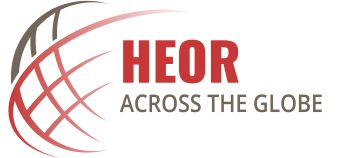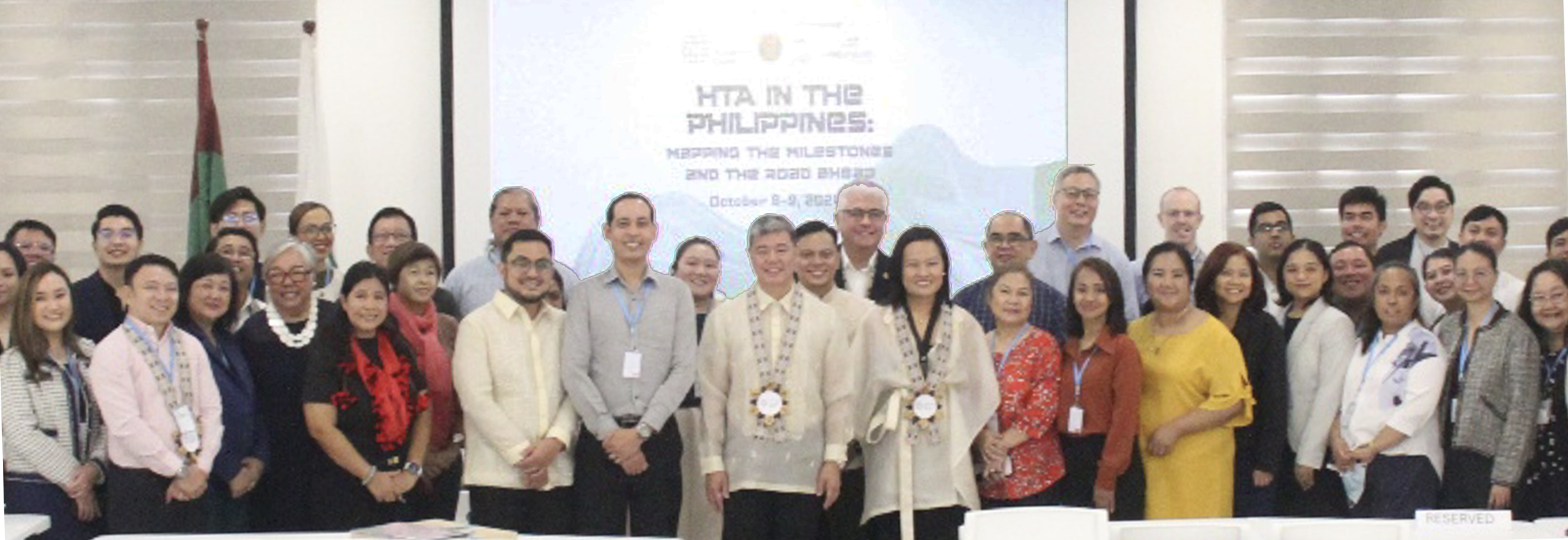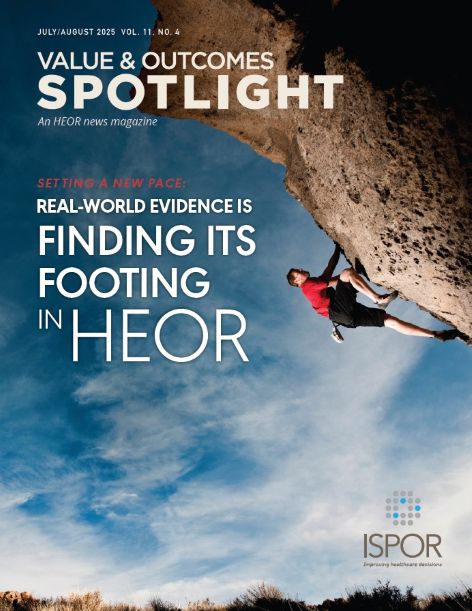HEOR Across the Globe
 Editor’s Note: Value & Outcomes Spotlight
is pleased to introduce “HEOR Across the Globe” as a recurring section
in the magazine. The Section Editors work with a small team of Regional
Reporters from Asia Pacific, Latin America, and Eastern Europe, Middle
East, and Africa to cover developments in health policies, news, and
events from these regions. If you have ideas for a story or want to
contribute an update, please email voseditor@ispor.org.
Editor’s Note: Value & Outcomes Spotlight
is pleased to introduce “HEOR Across the Globe” as a recurring section
in the magazine. The Section Editors work with a small team of Regional
Reporters from Asia Pacific, Latin America, and Eastern Europe, Middle
East, and Africa to cover developments in health policies, news, and
events from these regions. If you have ideas for a story or want to
contribute an update, please email voseditor@ispor.org.
ASIA PACIFIC
Section Editor: Paula Lorgelly, PhD, Auckland, New Zealand
ISPOR Philippines Reactivation: Highlights and Strategic Directions
Jason Alacapa, MD, MBA, MPH, MHM; Bernadette Joy Almirol, RMT; Richard Simon Binos, BS; John Paul Caesar delos Trinos, PhD, MPH, MHM; Madeleine de Rosas-Valera, MD, MSc; Mac Ardy Gloria, PhD, MPH; Carlo Irwin Panelo, MD, MA; Pura Angela Wee-Co, MD, MSc, MAHPS, ISPOR Philippines, Metro Manila, Philippines
The ISPOR Philippines hosted a 2-day conference in early October 2024 that brought together a wide range of stakeholders, reflecting the growing momentum and multisectoral support for institutionalizing health technology assessment (HTA) in the country. There were more than 100 participants from the government (eg, HTA Philippines, Department of Health, Philippine Health Insurance Corporation), academia, industry, patient organizations, professional medical societies, and development partners (ie, World Health Organization and Vital Strategies). The conference aimed to (1) discuss the progress, challenges, and opportunities for HTA in the Philippines; (2) present the updated HTA administrative order, methods guide, process guide, and stakeholder engagement framework; and (3) highlight the roles and responsibilities of various stakeholders in HTA.
The key recommendations for improving HTA in the Philippines included leveraging existing recommendations, providing additional resources for HTA Philippines, institutionalizing nominator-led assessments, clarifying and streamlining the prioritization of health technologies to undergo HTA, and improving interagency coordination.
During the 2-day conference, members of ISPOR Philippines also elected its new set of board members for 2025-2026. The election marks a significant step in the reactivation of the ISPOR Philippines Chapter with its renewed commitment to advancing health economics and outcomes research in support of evidence-informed healthcare decision making in the country. Following the elections, the new Board convened for a strategic planning session to identify the Chapter’s priorities and activities for the coming years. Three priorities were identified and discussed to further explore the Chapter’s role in driving country-level policies on HTA, universal healthcare, and patient access to medicines in the Philippines.
The full version of the conference proceedings and strategic plan summary can be found here. For more information about ISPOR global group activities and engagement opportunities, please contact globalgroups@ispor.org.
Participants at the ISPOR Philippines conference held on October 8–9, 2024.

Latin America
Section Editor: Diego Rosselli, MD, Bogotá, Colombia
New Chilean Law on Rare Diseases Aligns With HEOR Principles
Carla Campaña, PhD, Facultad de Medicina Clínica Alemana Universidad del Desarrollo, Facultad de Psicología Universidad del Desarrollo, Santiago, Chile
Recently, the law on rare, orphan, and low-prevalence diseases was enacted in Chile. This law establishes a national registry and a multisectoral technical advisory commission with representation from civil society, academia, and public institutions. This law, developed through years of advocacy by patient organizations, represents a significant shift toward inclusive and participatory health governance. The active involvement of patient communities strengthens the law’s legitimacy and exemplifies how collaborative policy making can align with the broader principles of health economics and outcomes research. This alignment emphasizes the importance of real-world impact, data transparency, and stakeholder engagement. These inputs are essential for making health decisions that are both scientifically rigorous and socially responsive. Moreover, incorporating civil society into health technology assessment (HTA) and policy advisory roles has enhanced transparency, accountability, and public trust. Patient and public involvement can improve the relevance and applicability of HTA outcomes, leading to policies that better reflect the lived experiences of affected individuals. Chile’s recent law sets a valuable precedent for other countries in the region by demonstrating how participatory models of governance can contribute to more equitable and evidence-based healthcare systems.
Healthcare Challenges in the Dominican Republic: A Call for Systemic Improvements
Diego Rosselli, MD, EdM, MSc, Pontificia Universidad Javeriana, Bogotá, Colombia
The Dominican
Republic, home to nearly 11 million people, faces significant healthcare
challenges despite its economic growth in sectors such as tourism,
construction, and mining. The country operates a multitiered healthcare system
common in Latin America, combining universal public services with private care.
While the system aims to provide broad access, including free basic coverage
for the most vulnerable through the Seguro Nacional de Salud, substantial gaps
remain.
The public healthcare sector, managed
by the Ministry of Public Health, struggles with chronic underfunding, resource
shortages, and wide regional disparities affecting quality and access. Public
facilities, although nominally free, often suffer from understaffing, poor
equipment, and supply shortages. Patients frequently must provide basic items
such as bedding, and some essential medical treatments incur high out-of-pocket
costs.
With only 5% of the gross domestic
product allocated to healthcare, the distribution of resources is uneven.
Private hospitals, primarily situated in major cities, provide high-quality,
technologically advanced care to those who can afford it, while rural and
poorer populations rely on lower-quality public services. Emergency services
tend to be slow, and waiting times are often extremely long.
Health experts emphasize the need for
significant investments to strengthen primary care and improve the availability
and equitable distribution of medical personnel and supplies. Attempts to
implement health technology assessment-driven decision making have been
hindered by concerns about rising healthcare costs and a shortage of adequately
trained human resources. This shortage is exacerbated by high turnover rates in
key positions within the responsible public institutions.
Recent media attention on the
healthcare system may serve as a catalyst for change. Health economists and
researchers suggest that broad discussions involving all stakeholders could
help address the current challenges effectively. They propose focusing on
improving resource allocation, enhancing primary care networks, and developing
strategies to retain healthcare professionals.
Despite the challenges, there’s
cautious optimism among healthcare experts. They believe that by embracing
evidence-based practices and innovative approaches, the Dominican Republic can
make significant strides in improving its healthcare system. Key areas for
improvement include strengthening primary care, implementing targeted
interventions to address regional disparities, and leveraging technology to
enhance efficiency and access.
As the country moves forward, the role of health economists and outcomes researchers will be crucial in providing the analytical framework and evidence base to support these transformations. Their goal is to help create a healthcare system that effectively serves all residents of the Dominican Republic, regardless of their socioeconomic status or geographic location.
Note: This article was refined with assistance from artificial intelligence (AI) and has been reviewed and edited by ISPOR staff. For more information or for inquiries on ISPOR’s AI policy, click here or contact us at info@ispor.org.
Eastern Europe, Middle East, and Africa
Section Editor: Bertalan Németh, PhD, Budapest, Hungary
Recent HTA Developments in the Middle East
Ahmad Nader Fasseeh, BSc, MBA, Syeron Research Institute, Alexandria, Egypt; Ahmed Yehia Khalifa, MSc, World Health Organization, Cairo, Egypt; Anas Hamad, MSc, PhD, Qatar University, Doha, Qatar; Hana Al-Abdulkarim, MSc, PhD, National Guard Health Affairs, Riydah, Saudi Arabia; Jenan Shaaban, MSc, Ministry of Health, Hawally, Kuwait; Mouna Jameleddine, MSc, PharmD, National Authority for Assessment and Accreditation in Healthcare, Tunis, Tunisia; Sara Al Dallal, MD, MSc, Emirates Health Economics Society, Dubai, United Arab Emirates; Said Wani, PhD, Ministry of Health, Muscat, Oman
Health technology assessment (HTA) in
the Middle East is experiencing considerable momentum, driven by strategic
commitments and structured implementation efforts across multiple countries.
Notably, Oman and Abu Dhabi’s Department of Health have recently published
comprehensive methodological guidelines, providing detailed guidance on
conducting HTA research and establishing official cost-effectiveness thresholds
with differential considerations for orphan drugs. Oman further introduced an
advanced critical appraisal checklist comprising more than 100 detailed
evaluation questions, significantly enhancing the rigor of HTA submissions.
The United Arab Emirates continues to
advance HTA within a broader regional shift towards value-based healthcare,
leveraging formal frameworks to inform healthcare coverage and optimize
resource allocation. Kuwait demonstrates a strong political commitment to
implementing HTA through a meticulously structured 3-year strategic plan aimed
at developing both human capacities and essential tools to realize their HTA
objectives.
In Egypt, the HTA landscape has
evolved significantly following the establishment of key authorities (UPA, EDA,
UHIA) and the Ministry of Health’s stewardship role, with current efforts aimed
at unifying HTA processes nationally and in collaboration with international
partners. Saudi Arabia further strengthens the regional landscape by
establishing a dedicated national HTA entity under the Center for National
Health Insurance, reflecting substantial progress towards system-wide
value-based healthcare integration.
In Qatar, HTA institutionalization
efforts are gaining momentum through a national HTA project led by the Ministry
of Public Health as part of the National Health Strategy 2024-2030. Tunisia’s
INEAS continues to set a regional benchmark, consistently delivering robust HTA
evaluations across healthcare technologies. These assessments inform
national-level decision making and are underpinned by comprehensive
methodological guidelines and active international collaboration. Tunisia is
currently prioritizing capacity transfer efforts, both at the national level
and regional level, to support broader collaboration. Collectively, these
developments highlight the region’s growing dedication to structured,
evidence-based, and transparent healthcare decision making.

